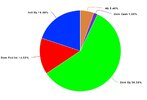Dona Ferentes
A little bit OC⚡DC
- Joined
- 11 January 2016
- Posts
- 15,107
- Reactions
- 20,487
Why you should keep buying shares well into old age
By John Beveridge - ...One really damaging myth that also deserves to be shattered is that investors need to progressively put more of their assets into cash or cash like investments such as bonds as they get older.
That is such a dominant narrative that there are even so called “lifestyle” super and other investment funds that are designed to follow that principle and it is also a common financial planning principle that is followed when advice is sought.
Selling shares is a big mistake
The big problem with all of this is that following this maxim is virtually guaranteed to cost you some serious money over time.In fact, some excellent 2013 research done by Dr Wade Pfau from the American College and Michael Kitces of the Pinnacle Advisory Group shows that in almost all circumstances, an investor is much better off slowly increasing the percentage of their assets invested in shares as they get older.
So, rather than selling down shares and holding more cash and bonds as you get older – something some have modelled by holding the same percentage as your age in bonds and cash – you are much better served by reversing that concept and increasing the percentage of shares in your portfolio over time.
Their research paper “Reducing Retirement Risk with a Rising Equity Glidepath” has been highly controversial but has so far survived many challenges to its basic results from those who can’t give up their idea of upping the amount of cash you should have in your portfolio as you age.
The reason the rising shares glidepath works so well is that if the share market is down or falling when you are converting cash into shares, you buy more and lock in better returns over time.
Or if you are buying as the market gets closer to a top, you are still enjoying stronger returns than cash provides and will build up a handy buffer against future bear markets.
In both cases you will reduce risk by progressively buying in periods where shares are cheaper and fewer when they are more expensive.
From the many critics who have emerged questioning the rising shares glidepath, I have only seen two real points that put much of a dent into the idea.
Sequencing risk
One is the concept of sequencing risk, which describes the risk that a couple of down years on the share market might have on the portfolio of somebody who is recently retired and is thus unable to make up those losses through extra earnings elsewhere.This is a very real risk, particularly for those with smaller levels of retirement savings, but it only lasts for a while and can be countered through a more careful following of the idea of the rising glidepath.
Being US research, the percentages of retirement savings allocated to bonds and cash are very high by Australian standards for all except the most conservative and risk averse investors.
Indeed, the most optimal rising glidepath from the paper is if the investor starts with a shares percentage of between 20% to 40% and increases that over time to between 60% to 80% in shares.
Adopting this approach would actually be seen as very cautious in the early years by Australian standards, but it would effectively guard against sequencing risks because such a small percentage of total assets would be exposed to the share market in the early years of retirement.
Panic selling must be avoided
The other criticism of the rising glidepath is effectively psychological and concerns whether older investors could cope with the inevitable share market falls and dips without panicking and selling at the worst possible time.This is arguably one of the main aims of financial planning which often sees advisers encouraging their customers to stay the course and not panic or fly to cash during market downturns.
However, many investors have now had a lot of experience riding out the many perils and pitfalls that the share market can serve up and they should be much better equipped to handle any volatility that a rising glidepath might throw up.
By maximising time in the market and minimising timing the market, returns are usually far superior.
Even conservative investors should be buying
What is interesting is that even for more conservative investors who might begin with a lower percentage of equities, the rising glidepath could still produce a far superior result than the more common and traditional but flawed “load up with more cash” approach.Adjusting for the Australian experience, the rising glidepath is likely to begin with local and international shares being closer to 60% of the average retirement portfolio but this research shows that this higher level could safely keep rising during retirement.
The amount remaining in cash would eventually be limited to just what is needed for immediate income needs without having to sell shares to fund regular payments.
Even here, Australian investors are lucky because our shares generally yield larger dividends than offshore shares and so can be relied on for a large chunk of income needs.
The rising glidepath might not suit everybody but it is certainly interesting to know that there is a real danger in slavishly following old-fashioned ideas of portfolio construction which would see the portfolios of most retirees selling shares and stockpiling lower yielding cash.

